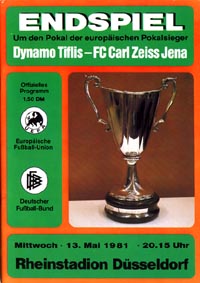Remember when Magdeburg, Mechelen, Aberdeen and Dinamo Tbilisi were European champions? Those clubs from East Germany, Belgium, Scotland and Georgia respectively were all winners of the lamentably departed Cup Winners Cup, the UEFA competition that did what it said on the tin and provided a competition for well… Cup Winners.
The Cup Winners Cup, a straight knock out tournament for the victors of domestic knock out tournaments tended to throw up more unexpected champions than in other tournaments and had a greater representation from a broader geographical area. Before the greater consolidation of power and wealth into the hands of a group of superclubs in a handful of leagues the Cup Winners Cup was a chance to see teams from corners of Europe that one was not necessarily exposed to on a regular basis.
Since that 1998-99 season UEFA has ran the two main European club competitions of the Champions League and Europa League but as of 2018 that could change. In 2018 the television rights for the two main competitions comes to an end and there area early discussion about returning a 3rd European club competition but one focused mainly on smaller clubs who exit other European competitions early. This could provide a potential windfall for Irish clubs who miss out on the lucrative group stages of either competition and present a tantalising array of possible outcomes. European football beyond September could finally be a realistic expectation for Irish clubs.
Such move would be in keeping with the ethos of UEFA president Michel Platini who has extended the European Championships to 24 sides and made changes to qualifying for club tournaments to give greater representation to smaller nations. Quite what format the tournament would take should UEFA decide to proceed with its creation is still up in the air. As reported in the Guardian the Scottish FA’s Stewart Regan said that
“It’s a discussion around whether it’s a separate third competition exclusively for smaller countries who then relinquish their place in the Europa League and/or Champions League or whether it’s a competition that basically acts as a further safety net for those clubs that enter the Champions League or Europa League but are typically out by August and then [instead] they fall down into a third competition,”
Whether smaller nations would choose to give up on the possibility, albeit a slim one, of qualifying for the Champions League in order to compete in a lower tier competition is dubious but the option for a follow up competition for club sides from smaller nations to compete in beyond August and September could prove to be a welcome boost. Such a competition could generate revenue and interest for clubs and also give club sides from smaller nations the opportunity to test themselves in a competitive environment against sides from other jurisdictions.
Manuel Veth, writing on the subject for the Futbolgrad.com website highlighted the example of the Baltic League competition held between the major teams from the Baltic States or the Royal League held between sides from Denmark, Sweden and Norway as regionalised multi-league tournaments that have already been tried.
A regionalised competition based on a straight knock-out format could prove popular, especially if victory could guarantee something like automatic group phase qualification for either the Champions League or Europa League the following season.
However, significant potential drawbacks from such a hypothetical competition exist. In a regionalised format would their be sufficient interest in a competition between top sides in say the Republic of Ireland, Northern Ireland, Scotland and Wales? Especially if a larger team like Celtic secured qualification through to the Champions League and were not involved? Much would depend on the prize money available and the draw of other sides in the competition. Irish football fans on both sides of the border would have seen interest in Setanta Cup wane once there was significant reductions in the prize money. Such prize money would most likely have to come from TV rights deals and sponsorship and it remains to be seen whether there would be an appetite on behalf of broadcasters to covers games in what would effectively be a third tier competition.
Even moderate TV income would benefit smaller clubs in smaller nations. Perhaps it could be considered in the negotiations of TV rights deals in 2018 with preferred bidders for the Champions League being required to purchase a certain number of games from this new tournament? Similarly UEFA could create a solidarity fund from the massive TV and sponsorship revenues that the Champions League and Europa League enjoy and use such a fund to provide incentives and prize money for clubs from smaller nations competing?
Despite the reforms brought in by Michel Platini and his administration to facilitate greater participation of small nations and their clubs there seems to be a growing gap between the hyper-wealth elite like Real Madrid, Barcelona, Bayern Munich, Chelsea and so on, the historic clubs from smaller and middling sized nations and clubs from more peripheral nations. Whether we like it or not, Ireland in this context is a peripheral nation. There has long been a hope among League of Ireland fans that an Irish side could “do a Rosenburg” and secure regular qualification for the group phases of major competitions but despite Shamrock Rovers making the Europa League group stages those days don’t appear to be on the immediate horizon.
In the absence of regular group stage qualification could a third tournament give us our European fix?
Originally posted on backpagefootball.com


